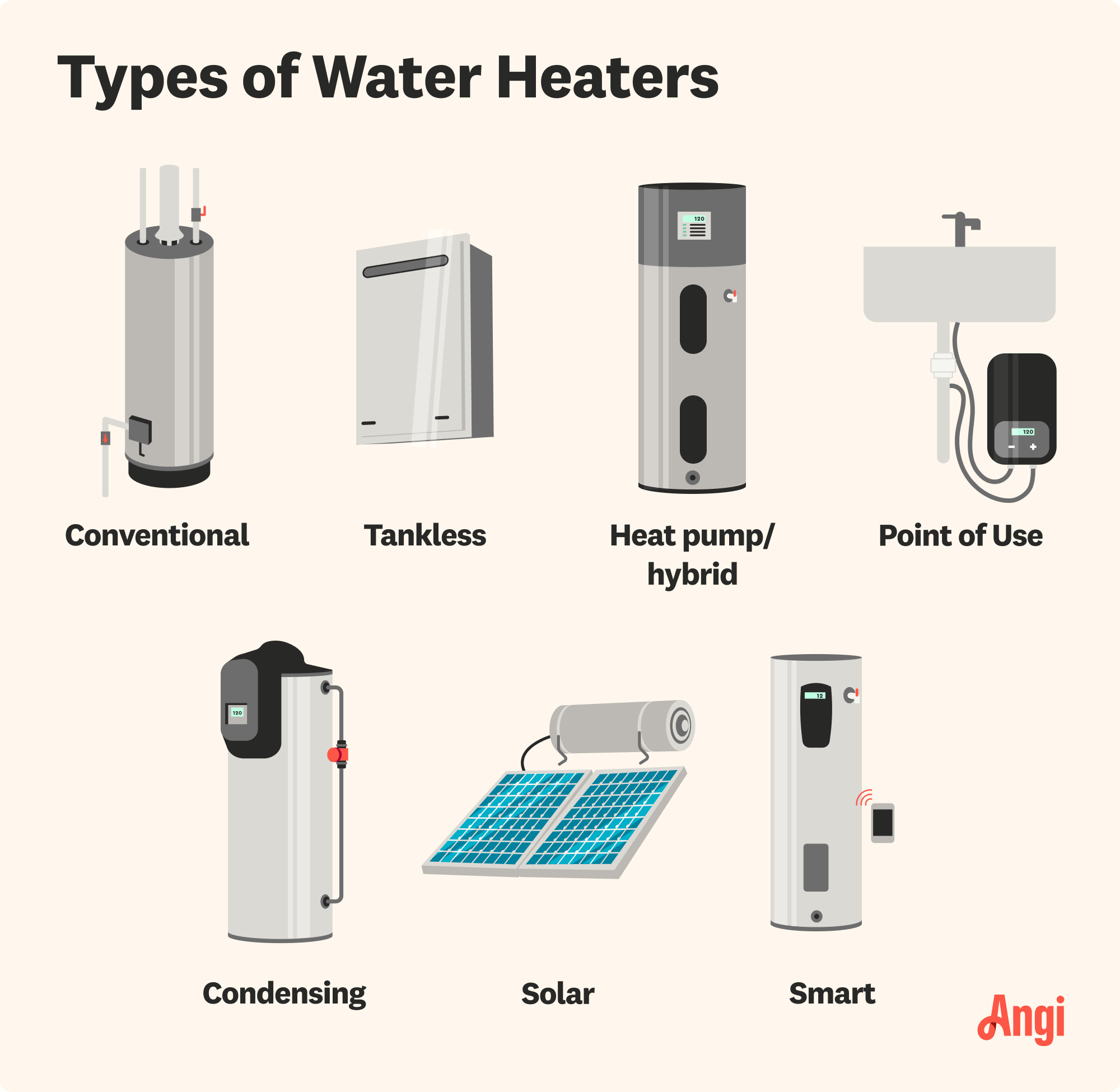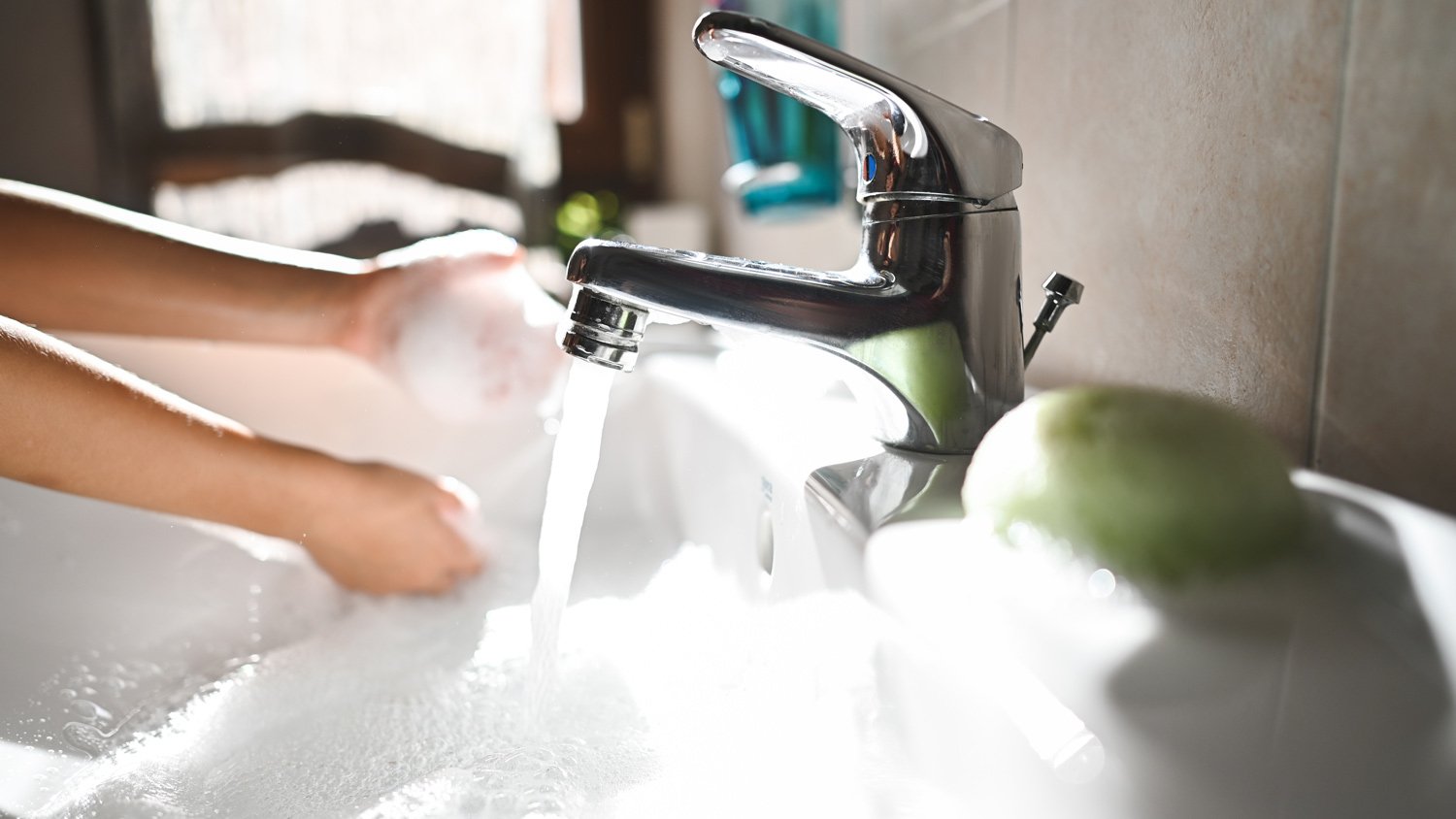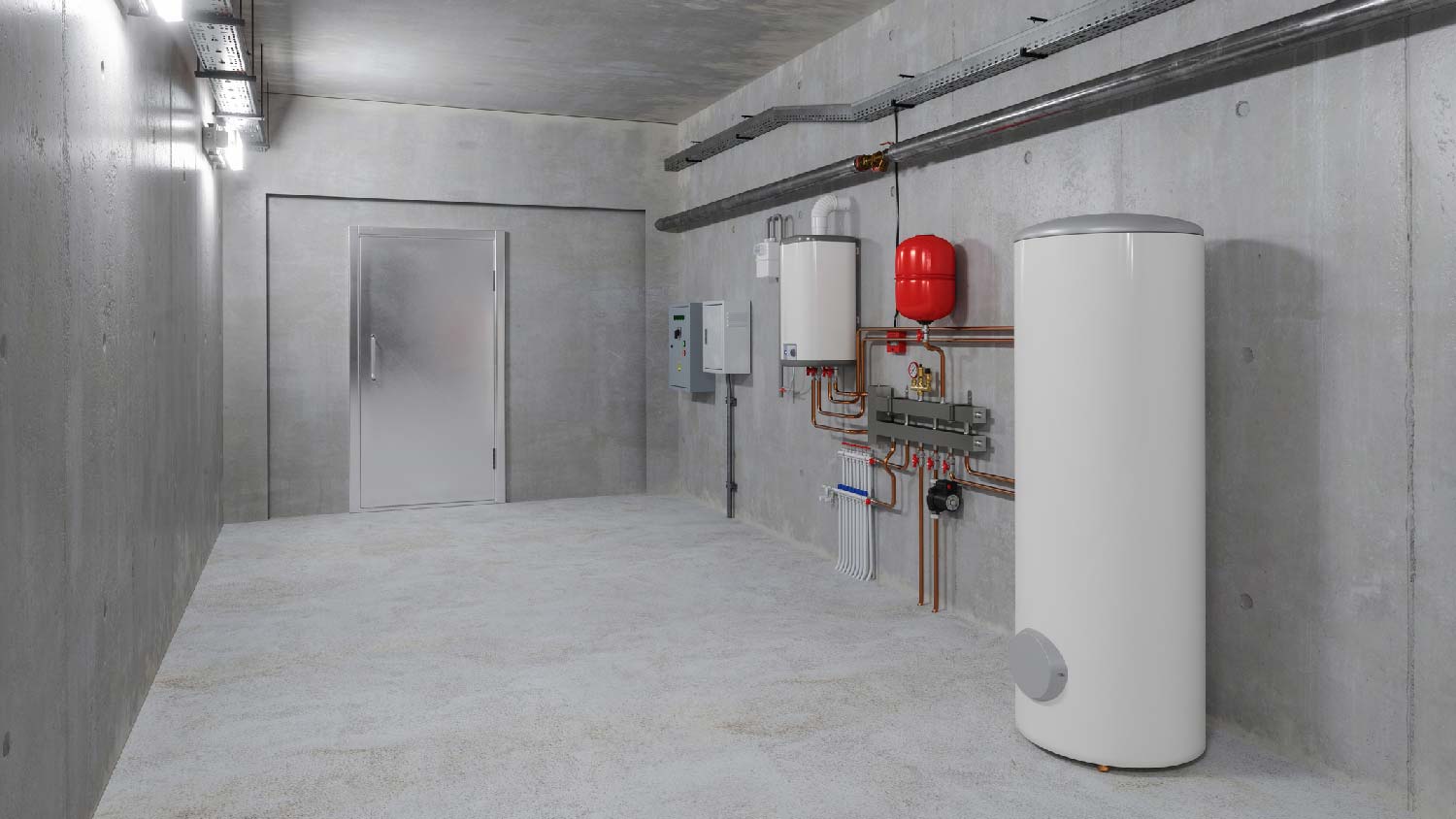7 Types of Water Heaters and How to Select the Right One for Your Home
You’ll never take a hot shower for granted again when you choose a new water heater


Unless your water heater has failed—leading to unpleasant, chilly showers—you may never have given the types of water heaters much thought. But if it’s time for an upgrade, there are many options on the market today to choose from. The best one for you will depend on a few factors, including the size of your household and budget. Let’s dive into all the types of water heaters available.

1. Conventional Storage Tank Water Heater

The conventional storage tank water heater is a popular option for homeowners, and it can be found in many homes, both old and new. As the name suggests, this water heater system comes with an insulated tank that holds and heats the water. Smaller tanks mean you’re more likely to run out of hot water before the water entering the tank has a chance to heat up.
How Storage-Tank Heaters Work
Two valves come with storage tank water heaters—a temperature-control valve and a pressure-control valve. Both are important, as the temperature valve controls how hot your water will get, while the pressure valve releases heat when the water temperature exceeds 120 degrees Fahrenheit.
2. Tankless Water Heater

If your home doesn’t have the storage space or capacity to hold a traditional tank water heater, then a tankless water heater is a great option for supplying hot water to your house. One of the biggest benefits of a tankless water heater is its energy efficiency. In fact, they can be up to 34% more efficient than a conventional tank-style water heater, according to the Department of Energy.
But, they’re also quite a bit more expensive—both in terms of outright purchase and any water heater repair costs down the road. If you go this route, ensure you have the budget.
How Tankless Water Heaters Work
Most tankless water heaters use natural gas to power a coil system to heat the water. Some models may run on electricity, which can get costly. The coils heat large amounts of water on demand, providing immediate hot water to your home. For this reason, tankless water heaters work well in cold climates with a higher demand for hot water.
3. Heat Pump

Hybrid water heaters, also known as heat pumps, combine the best of both worlds. Like conventional water heaters, hybrid models also have storage tanks. A hybrid water heater unit costs between $1,200 to $3,500, which is about 30% to 40% more than a traditional water heater system. They last about 13 to 15 years and are highly energy efficient, with an Efficiency Factor (EF) of 2%.
How Hybrid Heat Pumps Work
The most common type of hybrid heat pump is a geothermal heat pump, which transfers heat from the ground and up into your home in the winter and out of your home in the summer.
4. Solar Water Heater

If you already have solar panels installed, consider installing a solar water heater for an energy-efficient home. These water heaters don’t use the power grid for energy, saving you money in the long run.
How Solar Water Heaters Work
Like heat pumps, solar water heaters transfer energy into your water heater to heat the water—only solar water heaters use energy from the sun to do the job. Solar heat hits the solar panels and travels through a loop system to the tank, where it heats the water. Keep in mind that this water heater option is best for homes with plenty of sunshine.
5. Condensing Water Heater

Condensing water heaters are more energy efficient than traditional gas water heaters, making them a great alternative for homeowners who want to conserve energy. These differ from traditional, non-condensing water heaters in that they have a dual-heat exchange system, whereas conventional heaters have a single-heat exchange system. In many cases, you can use the same flue system you would for a conventional heater with a condensing water heater.
How Condensing Water Heaters Work
Condensing water heaters operate similarly to conventional storage tank heaters, but instead of releasing hot exhaust gases through the flue, these heaters redirect the gases to preheat the water in your boiler.
6. Point-of-Use Water Heater

Maybe your household has grown in size, and your hot water usage is increasing. If all you need is a backup to your current water heater setup, a point-of-use water heater is ideal for boosting your home’s current output when your central water heater isn’t cutting it. These systems are one way to ensure that your water is always hot.
How Point-of-Use Water Heaters Work
These water heaters connect directly to the fixture where you need hot water. This can be under your sink, near your shower, or even next to your washing machine. Point-of-use heaters use electricity to power a tank or a tankless heater that uses a heating element. Your single-point faucet or appliance releases the hot water when you turn it on.
7. Smart Water Heaters

A smart water heater system uses technology to monitor your water usage and turn your water heater on and off as necessary. This type of water heater will help conserve power since water heaters are one of the biggest energy hogs. These newer types of hot water heating systems come with different features depending on the type of smart technology you choose—and how much you’re willing to pay.
How Smart Water Heaters Work
Smart water heaters measure your water consumption, automatically adjust, and turn on and off at scheduled times. Typically, you can use Wi-Fi to control your smart water heater system from the convenience of a smartphone app. If your current unit is up to date, then it might be more budget-friendly to invest in a smart water heater thermometer, which allows you to adjust the temperature of your water heater as needed.
When Should You Replace Your Water Heater?
Knowing when to replace your water heater can save you from jumping into an ice-cold shower on a frigid day. Here are four signs that your water tank's life span is near its end and it's time to replace it.
1. Your Water Isn’t Hot

If your system is no longer effectively heating your water, and you’ve ruled out common causes of lukewarm water, there’s a good chance that it’s time to replace your water heater and upgrade to a new and improved one.
2. Your Water Is Cloudy
Too much sediment buildup in your water heater tank can result in grainy or cloudy water. Hardened sediment in older units is hard to clean out and can eventually damage your water heating system, resulting in inefficient heating. If you’ve tried draining the water heater tank to clear out the sediment and it’s still cloudy, your water heater may have reached the end of its useful life and needs replacing.
3. You Hear Rumbling Noises
If your water heater starts making noises, it may be on the fritz—especially if the unit is six or more years old. Households that use high amounts of hot water and put a greater demand on the system may find that the water heater becomes noisy faster. The pesky sediment buildup often causes the rumbling, which could be a sign that your system is about to leak.
4. You Have a Leaky Water Heater
Speaking of leaks, if you detect water on the ground around the tank of your water heater, there’s a very good chance you’ve got a leak. You’ll want to replace the old water heater as soon as possible to avoid hefty water damage in your home.
How to Choose Your Water Heater
While weighing the pros and cons of all the different water heaters, there are some additional considerations to remember as you shop for a new system.
Choose the Right Capacity
A heater that’s too small for your home won’t be able to keep up with the demand for hot water, which can result in cooler water temperatures. Figure out what size water heater you need before you start comparing your options to ensure you don’t spend more (or less) than you need on the right-fit water heater.
Check your water usage with a water audit to choose a water heater with the right capacity for your needs.
Find an Energy-Efficient Water Heater
Energy-efficient water heaters will save you money over time, even if they cost more than traditional water heaters. A few energy-efficient water heaters include solar water heaters, heat pumps, and tankless water heaters.
Pay Attention to the Warranty
Most water heater brands have a six—to 12-year warranty for the tank or parts. If your warranty has expired, it’s a good sign that your water heater is outdated.
Know the Fuel Type
Whether you’re comparing gas and electric water heaters or considering a combination of a few fuel types, knowing which type of fuel your prospective water heater uses is important for making the best decision for your family. For example, large households may want to avoid water heaters that use natural gas if they require larger gas lines.
Budget Accordingly
There’s no way around it—the cost of your water heater is a huge factor in replacing the system. The average price for a new water heater is around $1,190, though prices can range anywhere from $800 to more than $13,000 if you choose a solar water heater. Always plan on having a professional plumber install the unit for you.
Should You Contact a Pro to Help You Choose a Water Heater?
Each water heater has its advantages and restrictions. For example, a smaller home may not be able to accommodate a hybrid water heater due to the minimum space requirement. If you are struggling with choosing a water heater, consulting with a professional can save you time and money. A water heater installation contractor not only knows what type of water heater will work the best with your house’s plumbing, electric, and gas systems but will also factor in your overall water usage needs to help you find the best model.
Frequently Asked Questions
Heat pump water heaters, also known as hybrid water heaters, are the most efficient types of water heaters—both in terms of carbon emission and energy efficiency. This type of water heater utilizes as little as half of the energy of a traditional water heater while releasing no direct emissions. Tankless water heaters are also extremely efficient, although slightly less so than hybrid heaters.
Newer models are packed with newer technologies that decrease energy consumption and increase output, giving you more bang for your buck in more bills than one.
If you’re trying to decide whether you want to repair or replace your new heater, consider factors like your utility bills, repair costs, and even your carbon footprint to help you decide whether it makes sense to buy a new one instead.




- How Long Does a Water Heater Last? Should You Replace It?
- Top 7 Signs You Need a New Water Heater
- 6 Signs Of Water Heater Failure
- How to Size a Water Heater
- Top Causes of Water Heater Leaks and What to Do When It Leaks
- 9 Tips for Preventative Maintenance on a Hot Water Heater
- Why Your Hot Water Isn’t Working—And What to Do About It
- Comparing Heat Pump vs. Tankless Water Heaters
- Water Heater Making Noises? Main Causes & What to Do
- 14 Reasons Your Water Is Only Lukewarm











